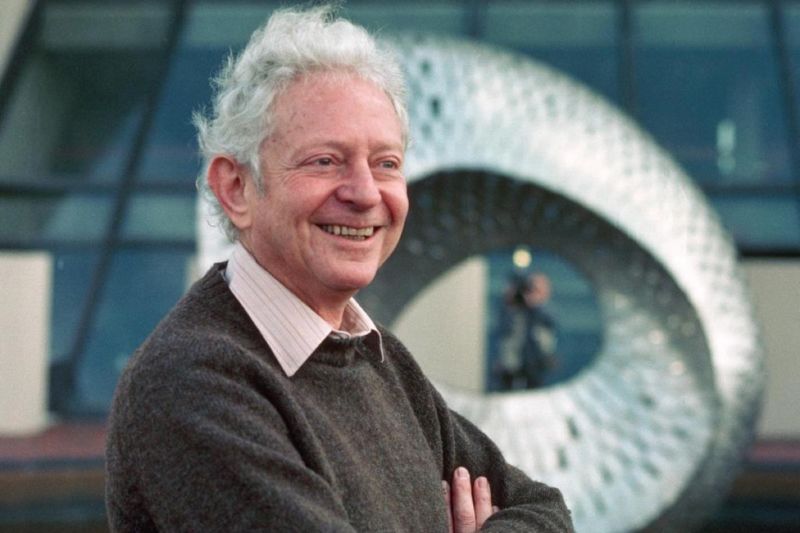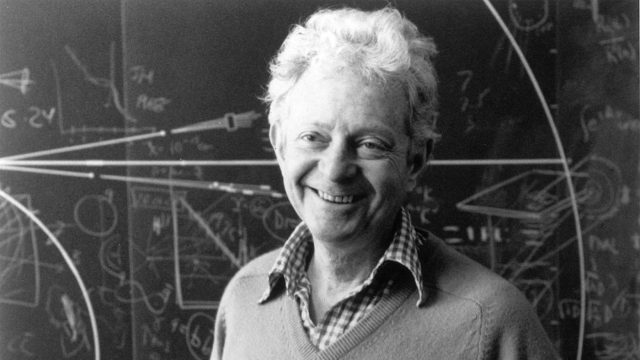
He was a leading light of particle physics, directing one of the most prestigious physics laboratories in the world. He won the Nobel Prize and irked his physics colleagues by coining the term "the god particle" to describe the Higgs boson. That long, rich life ended early Wednesday morning when physicist Leon Lederman died of complications from dementia at the age of 96.
Lederman first made his mark as a young physicist working at Columbia University's spanking-new cyclotron in the 1950s. In June 1956, two theoretical physicists, Chen Ning Yang and Tsung-Dao Lee, published a paper proposing that parity might not be conserved in weak interactions, suggesting several experiments to test their hypothesis. Parity had been considered a fundamental symmetry in physics, holding that our world is indistinguishable from its mirror image. In other words, there should be no difference, at the subatomic scale, between left- and right-handed rotations, or opposite sides of a subatomic particle.
Between Christmas and New Year's, a team of physicists at the National Bureau of Standards led by Chien-Shiung Wu performed a series of experiments. Wu and her colleagues were startled to find that—at least when it came to the beta decay of cobalt-60 nuclei—parity was indeed violated: nature appeared to be slightly left-handed. Lederman was lunching at a Chinese restaurant near Columbia with coworkers when he heard about the results. He quickly verified them by performing his own different set of experiments and came to the same conclusion.
“Lederman joked during his Nobel lecture that ‘The Two Neutrinos’ sounded like an Italian dance team.”
In 1962, Lederman struck experimental gold again while working on an experiment at Brookhaven National Laboratory's accelerator. He helped lay the framework for what we now call the Standard Model of Particle Physics. Lederman and two colleagues, Melvin Schwartz and Jack Steinberger, noticed that their neutron beams sometimes produced a muon rather than the expected electron, which proved the existence of the muon neutrino. So there were at least two types of neutrinos, not one.
He shared the 1988 Nobel Prize in Physics with Schwartz and Steinberger for that work, joking during his Nobel lecture that "The Two Neutrinos" sound like an Italian dance team. Physicists subsequently discovered a third neutrino, the tau-neutrino, which accompanied yet another (even heavier) electron.

This was something of a golden age for particle physics, as physicists discovered particle after particle over several decades to fill out the Standard Model. Lederman went on to lead the Fermilab team that discovered the bottom quark in 1977, and the following year he became the lab's director. With the discovery of the top quark at Fermilab in 1995, the Standard Model was pretty much complete. Only one more particle stubbornly remained to be found: the Higgs boson.
The Higgs proved so elusive to detection that Lederman jokingly suggested titling his popular book about the hunt (co-authored with science journalist Dick Teresi) The Goddamned Particle. The publisher nixed the profanity, and it became The God Particle instead, even though the Higgs boson has nothing to do with religion of any kind. The nickname is universally loathed by physicists, including Peter Higgs himself, from whom the boson gets its name.
Science journalist Ian Sample once asked a Manchester University physicist what he thought of the name. The response:
He paused. He sighed. And then he said: "I really, really don't like it. It sends out all the wrong messages. It overstates the case. It makes us look arrogant. It's rubbish." He then added: "If you walked down the corridor here, poked your head into people's offices, and asked that question, you would likely be struck by flying books.
Six years ago, Lederman was diagnosed with senile dementia. His doctors advised more peaceful surroundings, so he moved with his wife, Ellen, to their log home in Teton Valley, Idaho. They auctioned off his gold Nobel medallion to cover the extra medical expenses. It sold for just over $765,000, and Ellen Lederman told NBC News that she was surprised it sold at all: "We would let little kids play with it and have their picture taken." By his wife's account, Lederman's last years were ones of quiet contentment, even though he remembered less and less of his long, fulfilling life.
reader comments
44